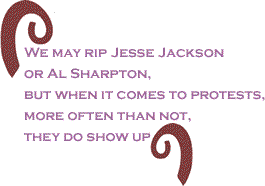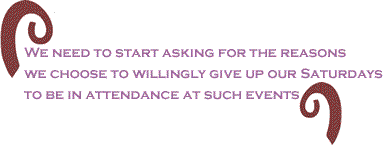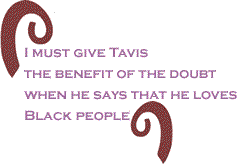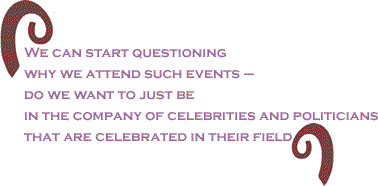
|
|||||||||||||||||||||
 |
|
Every year, radio/tv commentator Tavis Smiley holds a forum that brings together "the best and the brightest" African-Americans from academia, political, economic and health care, to hold panel discussions on what's wrong with Black America, and how we Black Americans should go about fixing it. This is a good gesture, if we truly believe it will bear positive fruit in the lives of African-Americans, to the point of where we will actually be motivated to take action to improve and take back the communities that serve to develop and nurture us. I cling to that hope, for in many instances, the hope of a better future is all we, as African-Americans, have left to sustain us. We live in a country where the President truly engages in all things Orwellian; from the reasons for war, to the reasons why our Black elected officials support legislation designed to harm more than help the majority Black districts they represent. So, when Brother Tavis holds his annual "State of the Black Union" conference, rather than blindly support these forums, we, as African-Americans, need to start asking, as well as looking, for the reasons we choose to willingly give up our Saturdays to be in attendance at such events. So, this year, when I attended the SOBU event in Houston, I decided I would ask the following questions: What do we hope to get out of the SOBU? Why do we attend?
In response to my questions to the attendees I spoke with, some stated they came to see certain individuals and hear them speak. Judging from audience reaction to comments made by economist Julianne Malveaux ("the mega-churches pimping of Black communities"), while the Rev. Floyd Flake tried to persuade the audience that all Black churches were not like the churches Dr. Malveaux attended, I would say that some attend because such notables will be the voices of concern and frustration that they cannot be. Marc Morial, Wade Henderson, and U. S. Rep. Sheila Jackson-Lee provided other topics for concern and discussion, largely to diffuse the conflict between Malveaux and Flake. Some were frustrated because Malveaux hit a nerve with her comments about Black "mega-churches," and since Rev. Flake couldn't really counter what she said, the moderator tried to move that panel along, leaving things that needed to be said, unsaid. Some attend for informational purposes, and the likes of Dr. Ian Smith, Michelle Singletary, Lynnette Khalfani, former NBA star Junior Bridgeman, or young Mr. Najee McGreen, serve to be useful as they share what African-Americans must do to become more prudent with our financial resources, and pay better attention to our health concerns, while learning how to talk to the physicians that are responsible for our care, yet have no clue of what African-Americans deal with that directly impacts their health. Some attend to hear leaders like Rev. Al Sharpton, and Minister Louis Farrakhan take their pot shots at the Bush Administration and everything wrong with it, not to mention echoing Kanye West ("George Bush doesn't care about African-Americans"). If we already didn't know that, Hurricane Katrina, and the devastation she caused should have torn the rose-colored glasses from our eyes. In last year's conference, there was a commitment to develop a sort of "Ten Commandments" for Black America, which became known as "The Covenant with Black America." This year, a book was given to all in attendance. It is the blue print for addressing the ills of Black America on economics, education, civic responsibilities, health and the environment.
The title of the book is "The Covenant." And we're supposed to go into our communities, after reading this book, and implement the plans for taking back our communities, and obtaining and maintaining the political clout that is ours come election time. This would be a good idea, if the blogsphere wasn't already showing signs of resistance from Black Americans who watched the SOBU on television. Many think that Smiley holds these forums because of personal gain, as well as more media exposure, and they could well be right. But, I must give him the benefit of the doubt when he says that he loves Black people, and that there are no other forums for us to come together and engage in dialogue on our problems and find ways to solve them. My suggestion to him, if what he says about why he has these forums are true, would be to do a few things: (a) Limit how many panelists you bring together on the stage. By the time they get through pontificating, the audience has little or no time to ask questions and participate. Instead, allow the panelists to speak, and then go out in the audience and pass a microphone and allow the audience to ask the questions they want asked. This facilitates true participation, and less like we're being subjected to a lecture. Most of us know what's wrong with our communities; we'd like to be able to get a question in every now and then, and see for ourselves if the "best and brightest" can "walk their talk." (b)
Hold actual workshops where participants can take back information
that is written down on paper. If you review the history of the
Civil Rights movement, people not only talked about what needed
to happen, they wrote out action plans that people followed to the
letter. Give them information that (c) Quit calling for boycotts of businesses when you don't tell the people in written form why they shouldn't shop or do business there. Many times you have to repeat this until it sticks. Then follow through by showing up to march, boycott, protest, whatever, with the people. Quit telling us to do this, and you're not going to be there to participate with us. We may rip Jesse Jackson or Al Sharpton, but when it comes to protests, more often than not, they do show up. Harry Belafonte walks his talk; how dare Bernice King be counseled by the likes of an Eddie Long to uninvited the man who so believed in her father's dream that he helped finance the movements that went with the dream, and provided support to her mother, brothers and sister, when her father was assassinated. (d) Tell people the truth; that there are no overnight solutions to problems which have plagued our race for almost 400 years. You must be willing to bring tenacity and "testicular fortitude" when going up against a resistance. The "status-quo" of our elected officials should not be allowed to stand when they are willing co-conspirators in our demise as they vote on egregious legislation as was outlined in the CBC Monitor's Report Cards.
(e) The way we can tell if any of these solutions are working is to evaluate their effectiveness. This may mean having this "conversation" more than once a year. It may mean giving actual deadlines for completion of projects. It will definitely mean holding someone accountable, and they must be equally willing to be scrutinized. We can attend events like the SOBU and walk away with a few hours, or days of euphoria as noted guests entertain us with their ability to give rousing speeches and arouse and galvanize our emotions that demonstrate our frustration and anger at largely being ignored as a people. Or, we can start questioning why we attend such events - do we want to just be in the company of celebrities and politicians that are celebrated in their field and are afforded accolades like Dr. Cornel West? Or do we attend because we want to know what we must do in order to make our lives and the lives of other African-Americans better than what we have now? Do the speakers provide that resource for us, or are they there to pontificate and tell us what to do, while demonstrating an equal unwillingness to get their hands dirty in doing the hard work of taking back our communities and healing them to wholeness on all fronts? I'll tell you why I attend such events - because I want to ask these questions, and determine for myself the correct courses of action to take. If any of these noted speakers are not willing to step into the fray with you, get their hands dirty, do the hard work, make themselves available to hear your concerns and provide you with concrete solutions (for which they should be held accountable), then we shouldn't support such venues, because we can always attend a Kanye West, Kirk Franklin or Norman Brown concert, if all we want to do is feel better about ourselves. We shouldn't be so willing to give up a Saturday (in my case as well as others, spend the money to travel to these venues) to feel good about ourselves while we listen to people talk loud and say nothing. Leutisha Stills is a member of the faculty administration at George Mason University, in Fairfax, Virginia, and can be reached at [email protected]. |
|
| Home | |
Your comments are always welcome. Visit the Contact Us page to send e-Mail or Feedback or Click here to send e-Mail to [email protected] e-Mail re-print notice
If you send us an e-Mail message we may publish all or part of it, unless you tell us it is not for publication. You may also request that we withhold your name. Thank you very much for your readership. |
|
| March
2, 2006 Issue 173 |
||||||||||||||
|
||||||||||||||
|
||||||||||||||
| Printer Friendly Version in Plain Text or PDF format. Download free Adobe Reader. | ||||||||||||||
 |
||||||||||||||
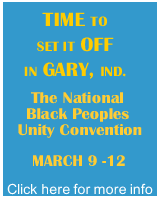 |
||||||||||||||
 |
||||||||||||||
 |
||||||||||||||
| |
||||||||||||||
| |
||||||||||||||






















